#fyodor lukyanov
Text
Most of the time, when heads of state talk about nuclear war, they speak in careful, measured tones, acknowledging the gravity of the nuclear taboo and the consequences of breaking it. The Russian president takes a different approach. Speaking at his annual foreign-policy conference a few years ago, Vladimir Putin reflected, without smiling, on the consequences of a nuclear war. “We will go to heaven as martyrs,” he said, “and they will just drop dead.”
At the same conference last month, a regime insider, Fyodor Lukyanov, asked him about this remark: “You said that we would all go to heaven, but we’re in no hurry to get there, right?” Putin did not answer. The seconds ticked by. Lukyanov said, “You’ve stopped to think. That’s disconcerting.” Putin responded, “I did it on purpose to make you worry a little.”
I did it on purpose to make you worry a little? Why does he want anyone to worry? Because fear is not just a feeling or an ephemeral emotion; it is a physical sensation. It can grip your stomach, freeze your limbs, make your heart beat faster. Fear can distort the way you think and act. Because it can be so paralyzing, human beings have always tried to make other human beings feel fear. If you can make your enemies afraid, they will not oppose you, because they cannot oppose you. You can then win the argument, the battle, or the war without ever having to fight.
Putin is a KGB officer who knows about the manipulation of emotions, fear most of all. For two decades, he has sought to evoke fear inside Russia. Unlike his Soviet predecessors, he doesn’t shoot or arrest millions of people. Instead, he uses targeted violence, specially designed to create fear. When the investigative reporter Anna Politkovskaya was gunned down in her Moscow stairwell, and when the businessman Mikhail Khodorkovsky was sent to prison for a decade, other journalists and other businessmen got the message. When the opposition politicians Boris Nemtsov and Alexei Navalny were murdered and poisoned, respectively, those incidents sent a message too. This isn’t mass terror, but it is just as effective. Fear keeps Putin in power by rendering people too frightened to report news, protest government actions, or conduct independent business or even independent activity of any kind.
Putin also seeks to create fear in the outside world, especially the democratic world. He does this, above all, by bantering about nuclear weapons, at conferences and everywhere else. Indeed, this has been a central subject of his public commentary, and of Russian propaganda more broadly, for many years. Pictures of mushroom clouds appear regularly on the evening news. Threats of nuclear strikes against Ukraine have been made repeatedly, as far back as 2014. Russia’s armed forces practice nuclear strikes as a routine part of military exercises. Back in 2009, they played out a war game that included dropping a nuclear bomb on Poland. This constant, repetitive nuclear signaling, which long predates the current war, has a purpose: to make NATO countries afraid to defend Poland, afraid to defend Ukraine, and afraid to provoke or anger Russia in any way at all.
— Fear of Nuclear War Has Warped the West’s Ukraine Strategy
#anne applebaum#fear of nuclear war has warped the west’s ukraine strategy#current events#warfare#nuclear warfare#politics#russian politics#psychological warfare#psychology#totalitarianism#russo-ukrainian war#2022 russian invasion of ukraine#russia#ukraine#poland#vladimir putin#fyodor lukyanov#anna politkovskaya#mikhail khodorkovsky#alexei navalny#boris nemtsov#kgb#nato
10 notes
·
View notes
Text
Russian avid gamers race to stop nuclear ‘conflict’

Story highlights
Newest craze in Moscow is conflict sport during which gamers race to search out nuclear codes
Russian officers are enjoying on fears, staging a mass nuclear drill
CNN
—
“Consideration! Consideration!” blares the Russian voice from a loudspeaker. “The nuclear bombs will likely be launched in a single hour.”
Inside a room styled as a Soviet-era nuclear bunker, a few Russians race to stop a catastrophic strike on america.
Their quest – the newest craze in Moscow – is to search out the nuclear launch codes and deactivate a hidden pink button, which has already been pressed by a mad Russian normal.
It’s full fantasy; simply an interactive game hosted in a constructing in a former industrial space of the town, paying homage to the fears of the Chilly Conflict.
However amid the present tensions with Russia, during which potential nuclear confrontation with the West has once more been raised, it feels slightly unsettling.
“I’m nervous as a result of there's very silly data from each side,” mentioned Maxim Motin, a Russian who has simply accomplished the Purple Button Quest sport.
“I do know that ordinary individuals all around the world don’t need any conflict,” he added.
However Russian officers have been making ready the nation for the potential of battle, stoking deep-seated issues a few standoff with the West, Russia’s outdated Chilly Conflict rival.
Russian tv has been broadcasting a mass coaching train, involving as much as 40 million individuals throughout the nation. It's designed to arrange responses, the federal government says, for a chemical or nuclear assault.

The video exhibits emergency employees with protecting fits and gasoline masks main the civil protection rehearsal, the largest of its type for the reason that collapse of the Soviet Union. It suggests the Kremlin needs Russians to take the specter of conflict very significantly.
In fact, all-out battle between Russia and the West stays extremely unlikely.
Analysts say the precept of Mutually Assured Destruction – or MAD – nonetheless holds as a deterrent, simply because it did throughout the Chilly Conflict.
However with tensions rising over Syria, Ukraine, and the Baltic states, analysts say a small danger of contact, misunderstanding and escalation between the nuclear superpowers has change into very actual.
“I don’t suppose nuclear conflict is probably going,” says Fyodor Lukyanov, editor of Russia in Global Affairs, a distinguished overseas coverage journal.
“However when two nuclear superpowers are working with their navy machines in the identical space, very shut to one another they usually don’t have correct coordination, any unintended factor can occur,” he advised CNN.
It's a danger the Kremlin appears eager to play up, with state tv upping its hardline rhetoric in latest weeks.
In its flagship present affairs present, Russia’s high state information anchor, Dmitry Kiselyev – dubbed the Kremlin’s propagandist-in-chief by critics – just lately issued a stark warning of world conflict if Russian and US forces conflict in Syria.
“Brutish conduct in the direction of Russia might have nuclear dimensions,” he declared.
The Russian protection ministry has additionally launched particulars of the newest intercontinental ballistic missile being added to its nuclear arsenal.
The Satan 2, because it’s recognized, would be the world’s most harmful weapon, guaranteeing Russia’s place as a high nuclear energy.
It's an apocalyptic imaginative and prescient that provides an extra sense of realism to the fantasy quest being acted out by avid gamers in Moscow.
“I do know that now in colleges in Russia they inform the kids that our fundamental enemy is the US,” mentioned Alisa Sokoleva, one other Moscow gamer.
“Nevertheless it sounds ridiculous to me and I’m completely positive that conflict is not possible,” she provides.

Again within the pretend Chilly Conflict bunker, the Russian avid gamers have cracked the launch codes and deactivated the missile launch. The USA, it appears, has once more been saved from this digital Russian nuclear assault.
Hopefully, the true world will likely be spared such a confrontation too.
Read the full article
#coldwar#conflictsandwar#easterneurope#europe#gamers#internationalrelations#internationalrelationsandnationalsecurity#military#militaryweapons#Moscow#northamerica#nuclear#nuclearweapons#prevent#race#Russia#Russian#UnitedStates#unrest#war#weaponsandarms#weaponsofmassdestruction
0 notes
Text
Meduza: Russian think tankers Nikolay Silaev and Fyodor Lukyanov discuss peace-talk challenges and the supposed diplomatic problem of Ukrainian agency
In an interview for Rossiya 24 earlier this week, MGIMO University researcher Nikolay Silaev and Russia in Global Affairs editor-in-chief Fyodor Lukyanov discussed possible diplomatic solutions in Ukraine. Lukyanov repeatedly cited a recent essay in Foreign Affairs by Samuel Charap and Sergey Radchenko about how negotiations between Moscow and Kyiv early in the war came closer than many believe to reaching a ceasefire.
In the conversation, Lukyanov appeared to be more receptive to the idea that not all diplomatic “mechanisms” have been exhausted, repeating arguments from Charap and Radchenko that talks in 2022 were too focused on “global security” issues rather than the concrete, granular steps needed to cease the war. Silaev countered that the Minsk Accords that previously halted large-scale fighting in the Donbas were too granular and neglected the larger, overarching security issues (namely, European alignments, relations with NATO, and so on). Lukyanov and Silaev agreed that one challenge in negotiations to end the war in Ukraine has been that the negotiators themselves don’t always represent the actual decision-makers. Lukayanov argued that Ukraine’s Western allies are the ones really in control, while Moscow was, in fact, steering the policies of the so-called DNR and LNR.
Silaev disputed the idea that Ukraine has no agency in peace talks, saying that the problem is instead that both sides wield influence and can “endlessly point fingers at each other,” complicating negotiations. However, Silaev’s acknowledgment of Ukrainian geopolitical agency is hardly flattering: in his view, the Ukrainian authorities’ will to act is based on an all-consuming pursuit of legitimacy in a national identity distinct from Russia. Echoing Vladimir Putin’s total rejection of Ukrainian nationhood, Silaev claims that Kyiv has embraced “Hitlerite collaborators” because it is supposedly the “only chapter” of Ukrainian history that is unrelated to Russia. Silaev says the Ukrainian authorities have resorted to “insane steps” to try to erase the country’s “polynuclearity,” particularly when it comes to Russian Orthodox Christians.
0 notes
Text
Why the EU could be the biggest loser from the Ukraine conflict
SOTT, Fyodor Lukyanov, RTSat, 09 Mar 2024 , https://www.sott.net/article/489640-Fyodor-Lukyanov-Why-the-EU-could-be-the-biggest-loser-from-the-Ukraine-conflict
As alarms bells ring in the West, Emmanuel Macron’s talk of NATO troops in Ukraine reflects a fear of failure
French President Emmanuel Macron has acknowledged that the Fifth Republic will not send its troops to Ukraine in the near…
View On WordPress
0 notes
Text
Una visión rusa del final de la guerra de Ucrania... Retroceder en Ucrania será visto ahora en todo el mundo como un signo de declive de Estados Unidos, algo que Washington no puede permitirse... esto significa que Rusia puede recibir un «empate» de una forma u otra... «Si realmente planean ocupar tierras ucranianas, tienen que aceptar que Ucrania sea miembro de la OTAN»... Rusia percibirá inevitablemente la adhesión de Ucrania a la OTAN como la preparación de un trampolín para un nuevo conflicto... ¿Qué tipo de ganancias territoriales harían que Moscú aceptara un acuerdo así? En teoría, Rusia podría aceptarlo si el sudeste de Ucrania, con Odessa y Járkov, quedaran bajo control ruso... No hay compromiso a la vista: la cuestión de la OTAN es una cuestión de principios para ambas partes. Rusia espera obligar a EEUU y a sus amigos a reconocer la necesidad de una retirada política en esta cuestión. Washington y sus aliados lo consideran categóricamente inaceptable. Se dan las condiciones para una escalada... El calor de la confrontación ya es tal que un nuevo aumento de la temperatura la llevará a un punto de ebullición total, es decir, cerca de una confrontación directa entre Rusia y la OTAN... El tercer año de campaña promete ser decisivo en todos los sentidos. Y no hay motivos para esperar una resolución en un futuro próximo, dada la complejidad del conflicto y la magnitud del premio en juego (Fyodor Lukyanov, presidente del Presidium del Consejo de Política Exterior y de Defensa)
0 notes
Text
Fyodor Lukyanov: The Hamas-Israel war is revealing a peculiar trend in international relations
Fyodor Lukyanov: The Hamas-Israel war is revealing a peculiar trend in international relations https://www.rt.com/news/584775-fyodor-lukyanov-israels-911-is/
0 notes
Text
0 notes
Link
[ad_1] As both Xi and Putin skip this year’s summit in India, it’s clear the status of the forum has diminished. It will not disappear, but the veneer of ‘world government’ attached to the group will dissipate By Fyodor Lukyanov, the editor-in-chief of Russia in Global Affairs, chairman of the Presidium of the Council on Foreign and Defense Policy, and research director of the Valdai International Discussion Club.The annual G20 summit is taking place in India this weekend. Any gathering of leaders of this caliber (and the 20 largest economies are the ones that really run the world) is a major event. All the more so because, in the context of the apparent weakening of traditional institutions in recent decades, the G20 has been seen as the prototype for a new structure of international governance. Without detracting from the importance of the forthcoming forum, it can be suggested that the group has already passed its peak and that the further evolution of the world system will contribute to the strengthening of other structures.The G20 is the product of the economic setbacks of the advanced globalization era of the late 20th and early 21st centuries. It emerged at the level of finance ministers and central bank governors in response to the Asian financial crisis of 1997-1998. But it really took off ten years later, when member states came together in emergency mode to quell the panic caused by the collapse of US financial institutions and the ensuing global financial crisis. Since then, the G20 has been at the center of the international political-economic architecture.The reasons for this are compelling. First, the official focus is on finance, trade, and economic concerns, which has so far allowed the growing political tensions between the largest participants to be circumvented. Second, the criterion by which the group is composed is the closest to what can be considered objective – the size of their economies. However, these two factors suffered most when the international situation deteriorated sharply. The upheaval that occurred in 2022, but had been brewing for some time, has changed the international hierarchy. Politics has finally overtaken economics. The expediency embedded in the concept of liberal globalization (above all, it must be cost-effective) has given way to considerations of strategic confrontation. The main issue now is the West versus Russia, although a US-China showdown is also on the way. In general, the institutions that ensured relative compliance with general economic rules are clearly not in the best shape, as the political needs of the largest countries outweigh any written order.We can add specific personal reasons why, for example, Vladimir Putin and Xi Jinping will not travel to the G20 summit, but that is not the point. Globalization in the form it existed for the last three decades or so is over. As a result, attitudes to the structures that were previously in demand are bound to change. This does not mean that the G20 as such will disappear – the meeting of leading economies is valuable in itself, and there will always be some benefit. But the veneer of ‘world government’ will disappear. Again, it is not about the confrontation of one country against another, but about the approach itself – grandees getting together to agree on something that affects everyone. From now on, agreements will be much more substantive and will involve a narrower circle of countries – those directly affected by a particular issue.Are there associations that are strengthened under these conditions? There are. First of all, there is the group of states now commonly referred to as the ‘collective West’. The last two years have shown that the potential for the political consolidation of the US and its allies is quite sufficient for unity, even against the economic interests of the participants. It is impossible to say how long this will last, but for the moment the cementing of the alliance is evident. The more problematic the economic consequences appear, the more rigid the value-ideological discipline will have to be. The pile on against one adversary, Russia, deliberately reduces flexibility towards another potential enemy, China. At the very least, Western European attempts to pursue an independent, economically motivated course in the direction of Beijing will not meet with US understanding. If such efforts continue, there will be direct opposition. However, there is another community that is not as consolidated as the West, but which has begun to find ways of uniting interests. It goes by various names – from the World Majority to the Global South – but the meaning is clear: it comprises those who are not part of the system of binding relations with Washington. By definition, there can be no value-ideological unity in this group of states – it is extremely heterogeneous. However, the formation of a blurred but nonetheless common identity, not in opposition to the West but parallel to it, is already taking place. In this sense, the outcome of the recent BRICS summit, which opted for widening membership rather than deepening existing links, is significant. It will not be possible to structure this majority anyway, but the creation of an expanding space of interaction beyond the West is in the interests of all. The alternative means an additional opportunity, and there is every reason to believe that this trend will gain momentum rather quickly.Could the G20 be a meeting place for these two communities? In theory, yes. But why? Both ‘collectives’ are primarily concerned with self-development. As for interests that overlap with those of the West, they will be dealt with at the level of the countries concerned, each of which has a different set of priorities.This state of affairs will not last forever, but for the time being the G20 will be more symbolic than practical. [ad_2]
0 notes
Text
Fyodor Lukyanov: Contrary To Western Claims, The BRICS Has An Ideology And Here’s What It Is
The South Africa summit showed how the non-Western bloc will evolve over the coming years
— By Fyodor Lukyanov, the Editor-in-Chief of Russia in Global Affairs, Chairman of the Presidium of the Council on Foreign and Defense Policy, and research Director of the Valdai International Discussion Club | RT | August 30, 2023
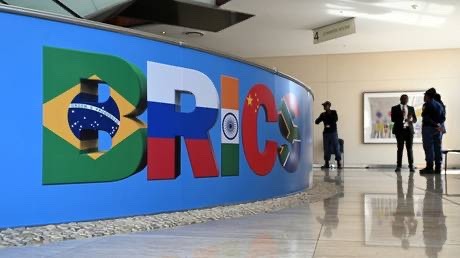
A banner depicting the logo of BRICS is seen during the 15th BRICS Summit in Johannesburg, South Africa © Sputnik International
Speaking at the end of the BRICS summit in Johannesburg, last week, Russian Foreign Minister Sergey Lavrov reassured those wondering what the acronym would sound like after the addition of six new letters: "Everyone is in favour of keeping the name the same, it has already become a brand". Whether he knew it or not, the diplomat had made an important point. The brand has taken on a life of its own, even though as an entity it no longer exists.
has given way to a new form. Continuing the metaphorical theme, we can say that the BRICS of the original model have transferred the franchise to another creation.
Until this month, BRICS was a group with the possibility of transforming itself into either a more or less structured organization or instead becoming a free-form community. The second option was chosen.
BRICS enlargement has been talked about for a long time. But discussions seemed pointless because there were no criteria for it to happen. The structure is deliberately informal, with no charter, procedures or coordinating bodies. Thus, classic diplomacy has been at work – with direct negotiations, without the involvement of international institutions – to reconcile national interests. The only platform where decisions are taken is at meetings of the leaders of the member states, and if they agree amicably it works. This is how the new states were invited — it was discussed and decided.
Of course, the selection caused confusion — why them, what is the logic? But there was none, it was just agreed.
This is a momentous event. It is not about the number and quality of the host powers, but about the choice of development model. Until now, BRICS has been a compact group whose members, for all their differences, have been united by their ability and willingness to chart an independent course, free from external constraints. There are few states in the world that can boast of this — some lack sufficient military and economic potential, and others already have commitments to other partners. But the five more or less fit the bill. For this reason, BRICS was seen as a prototype of a structure that would be a counterweight to the G7 (behind which there is a rigid Atlantic unity). Hence the expectation that BRICS would deepen and institutionalize interaction by creating common structures and gradually become a unified force on the world stage.
But such calculations were unfounded. Not so much because of the differences between the countries, but because of their size, which does not imply self-restraint for the sake of anyone, including like-minded people. The idea of giving BRICS a clear anti-Western bias was also incorrect – with the exception of Russia, no member now intends to pursue antagonism with the West. All in all, the BRICS-5 would have remained a promising and very symbolic prototype without the prospect of becoming a working model.
The forthcoming BRICS-11 – and beyond – is a different approach. Enlargement is hardly compatible with full-fledged institutionalization, because it would be too complicated. But there is no need for that; the expansion of the community's borders is now self-evident. Criteria are not essential. So what if Argentina or Ethiopia are in debt and have almost none of the things that were originally considered to be the hallmarks of the BRICS? But they, and probably some other candidates in the next wave, are expanding the sphere of non-Western interaction.
The other parameters are conditional.
China is the main proponent of enlargement. The new configuration is convenient for a power that promotes the slogan of an unspecified "common destiny" without commitments. The BRICS franchise is more in line with global trends than the previous type of BRICS. A rigid framework is unpopular; most countries in the world want a flexible relationship with maximum scope so as not to miss opportunities.
This new approach is acceptable to Russia. It is unrealistic to turn BRICS into a battering ram against Western hegemony. But it is in Russia's interest to expand the sphere of interaction by bypassing the West and gradually creating appropriate tools and mechanisms. In fact, it is in everyone's interest, because hegemony no longer warms anyone's heart, it only limits opportunities.
Success is not guaranteed; enlargement may lead to the automatic addition of new countries on a formal principle. But in general, the soft separation of the West and the non-West is an objective process for the coming years.
Thus, the popularity of the BRICS franchise will grow.
#RT#Analysis#Fyodor Lukyano#Western Propaganda#BRICS#Idiology#South Africa 🇿🇦#Non-Western Bloc#Russia 🇷🇺#Global Affairs#Presidium of the Council on Foreign and Defense Policy#Director | Valdai International Discussion Club
0 notes
Text
Gideon Rachman is chief foreign affairs columnist for the Financial Times and the 2016 winner of the Orwell Prize for Journalism. Even when I don't entirely agree with him I find his writing insightful.
In this column (archived) he compares France's 7.5 year colonial war in Algeria with Russia's neocolonial invasion of Ukraine.
Some excerpts...
France cannot be France without greatness,” wrote Charles de Gaulle in the opening of his memoirs. His nation, he insisted, must always be in “the first rank”.
Vladimir Putin feels the same way about Russia. Back when I was still able to visit that country, Fyodor Lukyanov — a foreign policy thinker close to Putin — told me that the Russian president was driven by the fear that his nation might permanently lose its status as a great power.
That fear and paranoia reached its tragic apogee with the full-scale invasion of Ukraine in 2022. But instead of restoring Russian national grandeur, Putin’s war has disgraced and isolated his nation.
Unlike Putin, de Gaulle’s belief in national greatness did not depend on the subordination of a neighbour. He ended France’s war in Algeria and accepted Algerian independence in 1962. By contrast, even after 30 years of Ukrainian independence, Putin could not accept Ukraine’s right to shape its own destiny.
Nobody would accuse the late President Charles de Gaulle of being soft on French patriotism; he had been the leader of the Free French forces during World War II. But de Gaulle had the sense to see that France was in a no-win situation in Algeria and this was leading to deep divisions in France itself. There was even a failed insurrection against de Gaulle by some French generals after he had entered into negotiations with the Algerian independence movement.
Algeria became independent in 1962 despite bitter opposition by some in France. Resistance was punctuated by acts of terrorism perpetrated by ethnic French former residents of Algeria. But de Gaulle knew that no matter how much disorder would ensue, saying good-bye to Algeria was the best option in the long run for France.
Where de Gualle decided to look to the future, Putin gradually sinks in the quicksand of the past. De Gaulle said adieu to colonialism but Putin refuses to say до свидания to neocolonialism.
As Gideon Rachman says in his FT piece...
Freed of its colonial burden in Algeria, France was able to forge a new future. Modern France is not a superpower, but it remains a leader in Europe. It is a global player in culture, diplomacy, business, sport and military affairs. France retains some of the badges of great-power status, such as nuclear weapons and a permanent seat on the UN security council. But its grandeur today rests on culture and the global respect it inspires, rather than on raw power or territory.
Putin, by contrast, was unable to imagine Russia as a post-imperial power. He still defines Russian greatness through his country’s ability to control territory and inspire fear. It was de Gaulle who was born in the 19th century, but it is Putin who clings to a 19th-century imperialistic view of national grandeur.
In the 21st century, however, the bloodbath that Putin has unleashed in Ukraine has inspired disgust rather than admiration in the rest of Europe, isolating Russia from its neighbours and reducing its influence in the wider world.
[ ... ]
Putin has been unable to separate his vision of national grandeur from his personal power and wealth. He clings on in the Kremlin. Those who disagree with his policies are beaten up in the streets, imprisoned, driven into exile or die in suspicious circumstances. Russia needed its own de Gaulle. Instead, it has ended up with a pale imitation of Ivan the Terrible.
Perhaps a Russian version of de Gaulle would be good, but a Russian version of Atatürk would be better. Somebody needs to drag Russia, screaming and kicking, from the 18th century into the 21st century.
#invasion of ukraine#gideon rachman#vladimir putin#neocolonialism#ukraine#charles de gaulle#algeria#colonialism#algerian war of independence#россия#владимир путин#путин хуйло#путлер#агрессивная война россии#неоколониализм#военные преступления#нет войне#путин – это лжедмитрий iv а не пётр великий#геть з україни#вторгнення оркостану в україну#україна переможе#будь сміливим як україна#слава україні!#героям слава!
1 note
·
View note
Text
Fyodor Lukyanov: 20 years after Bush declared 'mission accomplished,' it's clear that Iraq was the graveyard of American ambition
Fyodor LukyanovRTFri, 05 May 2023 07:02 UTC – SOTT net
© Joe Raedle / Getty ImagesUS Marines of Task Force Tarawa prepare their vehicles at Camp Shoup, near the Iraqi border, in Kuwait.
George W. Bush’s illegal invasion came at a time when the US was the only real global power, and high on its own self-confidence.
Twenty years ago, in May 2003, then-US President George W. Bush landed on the…
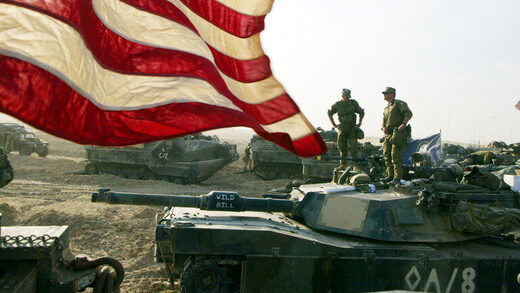
View On WordPress
0 notes
Text
China’s Xi is right, the world is currently undergoing changes not seen for a century — Apsny News
It’s time to buckle up, because the post-WW2 and Cold War systems no longer suit the global order
By Fyodor Lukyanov, the editor-in-chief of Russia in Global Affairs, chairman of the Presidium of the Council on Foreign and Defense Policy, and research director of the Valdai International Discussion Club.
Humanity has been gripped by a frenzy. The political and military crisis in Europe has…
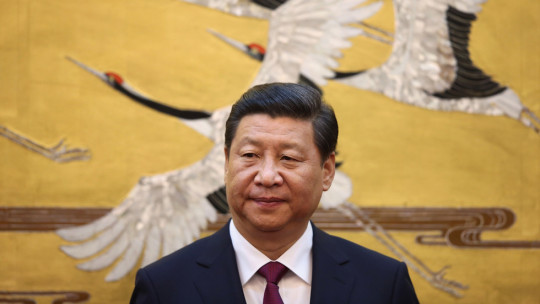
View On WordPress
0 notes
Text
What Russia's suspension of the New START nuclear Treaty means for the world — RT World News
The Medvedev-Obama era agreement was the last major bilateral security deal remaining between Moscow and Washington
By Fyodor Lukyanov, the editor-in-chief of Russia in Global Affairs, chairman of the Presidium of the Council on Foreign and Defense Policy, and research director of the Valdai International Discussion Club.
The suspension of the New START Treaty was the most important news item…
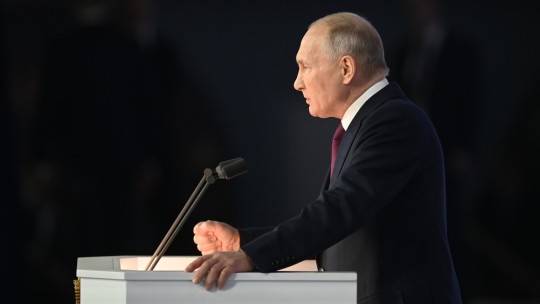
View On WordPress
0 notes
Text
Fyodor Lukyanov: Why the ‘world majority’ sees the Ukraine conflict as an example of declining European and North American power
Most believe ethnic Europeans are colonialists and hope to end their stranglehold on power
By Fyodor Lukyanov, the editor-in-chief of Russia in Global Affairs, chairman of the Presidium of the Council on Foreign and Defense Policy, and research director of the Valdai International Discussion Club.
It’s now the fall of 2023, and the Ukraine conflict has become an integral part of the…
View On WordPress
0 notes
Text
What Russia's suspension of the New START nuclear Treaty means for the world — RT World News
The Medvedev-Obama era agreement was the last major bilateral security deal remaining between Moscow and Washington
By Fyodor Lukyanov, the editor-in-chief of Russia in Global Affairs, chairman of the Presidium of the Council on Foreign and Defense Policy, and research director of the Valdai International Discussion Club.
The suspension of the New START Treaty was the most important news item…
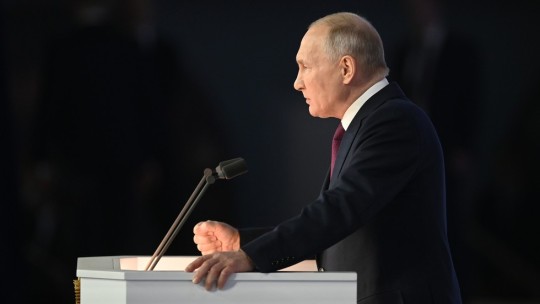
View On WordPress
0 notes
Text
Graham Allison: ‘Time to Search for an Off-Ramp’ in Ukraine
Graham Allison: ‘Time to Search for an Off-Ramp’ in Ukraine
(Russia Matters – russiamatters.org – Oct. 31, 2022)
This is a transcription of an interview by Moscow-based analyst Fyodor Lukyanov for his television program Mezhdunarodnya Panorama that aired in Russian on Oct. 21.
Moscow-based analyst Fyodor Lukyanov interviewed Harvard professor Graham Allison for a program that aired in Russian on Oct. 21. Allison, an expert on the Cuban missile crisis,…
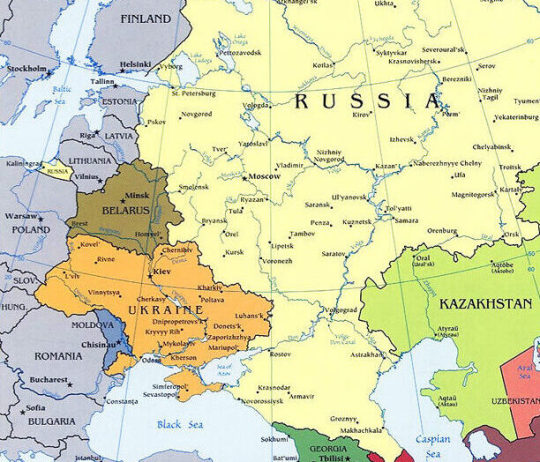
View On WordPress
0 notes